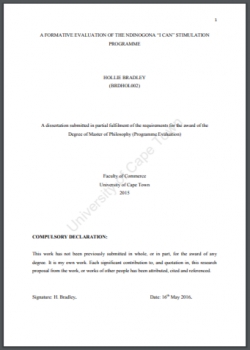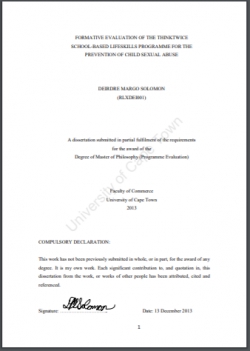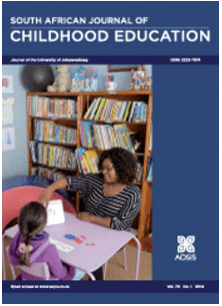A formative evaluation of the Ndinogona 'I can' stimulation programme

Type
Thesis
Authors
Category
ECCE, Preschool
[ Browse Items ]
Publication Year
2016
Publisher
URL
[ private ]
Pages
84 p.
Subject
Early childhood care and education (ECCE), Early childhood development (ECD), Young children, Disabled children, Caregivers, Training, Play, ECD centres, Inclusive education, Evaluation, South Africa
Tags
Abstract
This dissertation reports an outcome and process evaluation of the Ndinogona ''I Can'' Stimulation Programme. The programme caters for children with disabilities by targeting Early Childhood Development (ECD) centres attended by children with disabilities. The programme facilitators provide training to the caregivers within these centres in terms of the importance of play and how to handle and position children with disabilities correctly. The centres are also provided with stimulation kits including a variety of toys and activities aimed at children with all types of disabilities. The programme aims to encourage stimulation and inclusion of children with disabilities as well as to improve child developmental outcomes. The programme has been implemented in several centres since it began in 2011. This dissertation focused on 18 centres within the Western Cape which received the programme during 2015. The Ndinogona ''I Can'' Stimulation programme theory was investigated for its plausibility in the form of a literature review. The evaluation focused on evaluating programme outcomes to determine the programme's effectiveness as the programme requires an independent evaluation for a funder. This evaluation therefore primarily addressed two outcome evaluation questions and one process evaluation question. The outcome evaluation used secondary data which was set to be collected by the programme's facilitators using data collection forms developed by the evaluator in collaboration with the programme staff. This outcome evaluation could not be realised due to a lack of empirical data stemming from inadequate data collection tools and procedures. The available data were analysed using the SPSS statistical programme. The descriptive statistics and the initial exploration of the data are presented. The results for the outcome evaluation questions are limited due to the lack of empirical data. Preliminary findings for child assessments showed a positive trend, however, more data is needed to confirm this. As a result of the lack of data the evaluator engaged with additional process questions in the discussion chapter and presents a revised monitoring and evaluation framework for the programme to facilitate an in-depth outcome evaluation in the future. This includes a clear and simple set of data collection tools which cater for all the organisation's information needs whilst taking into account their monitoring capacity.
Description
Thesis (MPhil)--University of Cape Town
Number of Copies
1
| Library | Accession No | Call No | Copy No | Edition | Location | Availability |
|---|---|---|---|---|---|---|
| Main | 791 | 1 | Yes |



